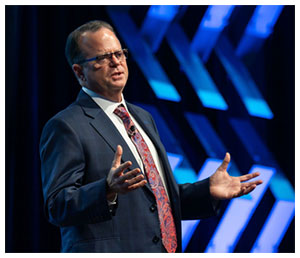 At the second General Session of the 2023 NCPA Annual Convention at the Orange County Convention Center, NCPA President Hugh Chancy took the stage to the chorus of Survivor's 1982 song "Eye of the Tiger" to welcome a packed hall. Chancy introduced Rep. James Comer (R-Ky.), who received a standing ovation and an enthusiastic round of applause. Comer is chair of the House Committee on Oversight and Accountability that has, since March, been investigating PBMs to tackle the rise in health care costs for everyday Americans.
At the second General Session of the 2023 NCPA Annual Convention at the Orange County Convention Center, NCPA President Hugh Chancy took the stage to the chorus of Survivor's 1982 song "Eye of the Tiger" to welcome a packed hall. Chancy introduced Rep. James Comer (R-Ky.), who received a standing ovation and an enthusiastic round of applause. Comer is chair of the House Committee on Oversight and Accountability that has, since March, been investigating PBMs to tackle the rise in health care costs for everyday Americans.
Comer's own congressional district in Kentucky is defined by the strong, positive impact independent pharmacies have on his constituents, he reported, and it's an impact that keeps communities together.
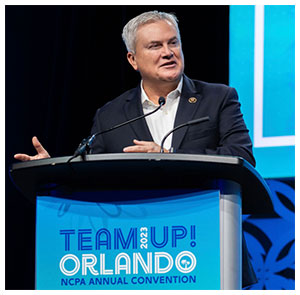 "I represent a very rural area in Kentucky and my congressional district spans a third of the state. We have 35 counties and about 20 of them don't have a single chain pharmacy. They have mom-and-pop pharmacies—and these people are the leaders of their communities. The independent pharmacies in my district provide quality health care and the best price option for their patients," he told attendees.
"I represent a very rural area in Kentucky and my congressional district spans a third of the state. We have 35 counties and about 20 of them don't have a single chain pharmacy. They have mom-and-pop pharmacies—and these people are the leaders of their communities. The independent pharmacies in my district provide quality health care and the best price option for their patients," he told attendees.
On Sept. 19, NCPA's Chancy testified at a House Oversight Committee hearing titled "The Role of Pharmacy Benefit Managers in Prescription Drug Markets Part II: Not What the Doctor Ordered," which considered pricing tactics deployed by PBMs to enrich themselves at the expense of patients across the country. The September hearing came on the heels of a May 23 committee hearing that examined how PBMs have an oversized role in the pharmaceutical marketplace.
These hearings are part of a larger fact-finding mission in preparation of a report that will reveal, once and for all, where health care ends and self-interest begins, Comer said.
"In addition to increasing transparency, we need to do more," Comer continued, to widespread applause. "[This investigation] is a priority for our committee. The work you've done over the last few years to educate state legislators and members of Congress is about to pay dividends."
Award recipients personify leadership and service
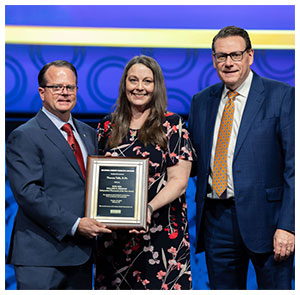 Florida pharmacist Theresa Tolle was recognized at the General Session for her exemplary leadership and commitment to independent pharmacy and named the 2023 NCPA Willard B. Simmons Independent Pharmacist of the Year. This year marks Upsher-Smith's 15th year of sponsoring the prestigious award in conjunction with NCPA. The award is named in honor of Willard B. Simmons, a former executive secretary of NCPA (then known as the National Association of Retail Druggists) and a longtime trustee of the NCPA Foundation. Learn more!
Florida pharmacist Theresa Tolle was recognized at the General Session for her exemplary leadership and commitment to independent pharmacy and named the 2023 NCPA Willard B. Simmons Independent Pharmacist of the Year. This year marks Upsher-Smith's 15th year of sponsoring the prestigious award in conjunction with NCPA. The award is named in honor of Willard B. Simmons, a former executive secretary of NCPA (then known as the National Association of Retail Druggists) and a longtime trustee of the NCPA Foundation. Learn more!
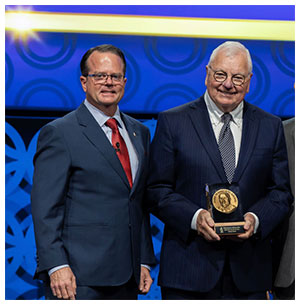 William Letendre of Cornelius, N.C. and Naples, Fla., was awarded the 2023 John W. Dargavel Medal by the NCPA Foundation for his contributions on behalf of independent pharmacy, which embody the spirit of leadership and accomplishment. Letendre is a former pharmacy owner, as well as a past president of the American College of Apothecaries, the New Hampshire Pharmacists Association, and the Texas Pharmacy Association. The award is named for John W. Dargavel, a former executive secretary of the National Association of Retail Druggists (now NCPA) from 1933-1961. The McKesson Corporation sponsors the annual award. Learn more!
William Letendre of Cornelius, N.C. and Naples, Fla., was awarded the 2023 John W. Dargavel Medal by the NCPA Foundation for his contributions on behalf of independent pharmacy, which embody the spirit of leadership and accomplishment. Letendre is a former pharmacy owner, as well as a past president of the American College of Apothecaries, the New Hampshire Pharmacists Association, and the Texas Pharmacy Association. The award is named for John W. Dargavel, a former executive secretary of the National Association of Retail Druggists (now NCPA) from 1933-1961. The McKesson Corporation sponsors the annual award. Learn more!
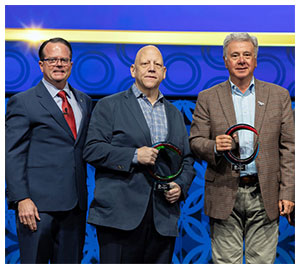 Finally, CPESN USA announced the winners of the 2023 CPESN® Luminary-of-the-Year Award, sponsored byPrasco. CPESN® Mississippi lead luminary Bob Lomenick and CPESN® NYC lead luminary Roger Paganelli were recognized for their leadership in forging stronger bonds between the national network and their respective local networks. Lomenick is the long-time owner of Tyson Drugs in Holly Springs, Mississippi and Paganelli is third-generation co-owner of Mount Carmel Pharmacy in the Bronx along with his brother, Armand. Learn more!
Finally, CPESN USA announced the winners of the 2023 CPESN® Luminary-of-the-Year Award, sponsored byPrasco. CPESN® Mississippi lead luminary Bob Lomenick and CPESN® NYC lead luminary Roger Paganelli were recognized for their leadership in forging stronger bonds between the national network and their respective local networks. Lomenick is the long-time owner of Tyson Drugs in Holly Springs, Mississippi and Paganelli is third-generation co-owner of Mount Carmel Pharmacy in the Bronx along with his brother, Armand. Learn more!
"People want an honest deal"
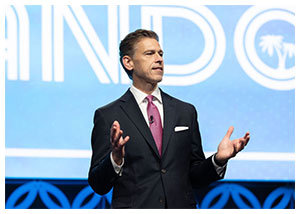 After the awards ceremony, NCPA CEO Douglas Hoey took to the stage and recalled a July road trip he shared with NCPA's Chancy to visit Florida pharmacies and gain an on-the-ground understanding of the plight of independents ahead of the DIR hangover. One of their Chipotle lunches during the trip, explained Hoey, provided an apt metaphor for the crux of the problem.
After the awards ceremony, NCPA CEO Douglas Hoey took to the stage and recalled a July road trip he shared with NCPA's Chancy to visit Florida pharmacies and gain an on-the-ground understanding of the plight of independents ahead of the DIR hangover. One of their Chipotle lunches during the trip, explained Hoey, provided an apt metaphor for the crux of the problem.
"Hugh's leftover burrito bowl reminds me of the pharmacy payment model," Hoey said. "It's a mess."
Quoting Thomas Edison's axiom that vision must be paired with execution if anything is going to get done, Hoey lamented the challenges that independent pharmacies face in taking action. "When growing your business is a bad thing, it's a perverse sign that PBM voodoo economics must come to an end."
Changing the pharmacy payment model, he said, includes being paid fairly for dispensing and primary care services that pharmacists provide all the time, which has never been more critical than now, a time when the scope and capabilities of pharmacists have never been broader.
Thinking broadly about pharmacy's future is a key dimension of thinking broadly—and critically—about health care's future, as well.
To that end, Marty Makary, MD, MPH, a New York Times bestselling author and a gastrointestinal surgeon at Johns Hopkins, delivered a keynote address in which he challenged the medical establishment to remember medicine's noble heritage of caring for people when they are vulnerable.
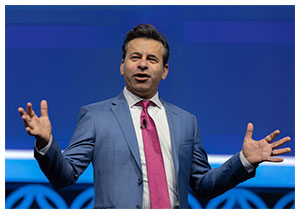 Makary is also a frequent medical expert on NBC and FOX News and writes for The Wall Street Journal and USA Today. During COVID-19, he emerged as a trusted source on several dimensions of virus' spread, the vaccine roll-out, and the aspects of public health policy that the pandemic would likely transform. Notably, his February 2021 op-ed for the Wall Street Journal drew a firestorm of responses when he opined that herd immunity would occur much faster and more effectively than public health officials were leading people to believe at the time.
Makary is also a frequent medical expert on NBC and FOX News and writes for The Wall Street Journal and USA Today. During COVID-19, he emerged as a trusted source on several dimensions of virus' spread, the vaccine roll-out, and the aspects of public health policy that the pandemic would likely transform. Notably, his February 2021 op-ed for the Wall Street Journal drew a firestorm of responses when he opined that herd immunity would occur much faster and more effectively than public health officials were leading people to believe at the time.
Speaking to a packed hall, Makary spoke about why a patient-first model of care might seem like a no-brainer but is often diminished by anticompetitive practices in the health care industry. There's a lot to be skeptical about, he said, which is a quality he comes by honestly—his family grew up watching state-controlled media, and his cross-Atlantic upbringing meant observing and adapting to different cultures. He has always had what he calls the "third-culture kid" syndrome.
"My family is from Egypt, which is why I have brown skin. I was born in the U.K., which is why I slip into a British accent sometimes. And I was raised in the United States, which is why I have Type-2 diabetes," he quipped.
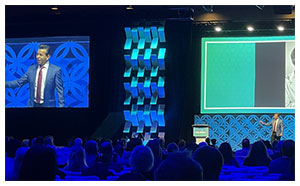 But the health care system's failings, he says, amount to serious business. One in five Americans now has medical debt in collections and rising health care costs today threaten every small business in America. Even if the system is broken, however, there are some innovative solutions that we can pursue. The challenge, said Makary, isn't finding the courage to fix aspects of a broken system. It's finding the courage to fix the entire system.
But the health care system's failings, he says, amount to serious business. One in five Americans now has medical debt in collections and rising health care costs today threaten every small business in America. Even if the system is broken, however, there are some innovative solutions that we can pursue. The challenge, said Makary, isn't finding the courage to fix aspects of a broken system. It's finding the courage to fix the entire system.
"On my research team, we have pursued issues that aren't being discussed to focus on patients. It's about redesigning the entire health care system."
He used "Washington Crossing the Delaware," an 1851 painting by Emanuel Leutze that hangs in the White House, as a metaphor for artful narratives that we perpetuate about historical events and health care alike, which we must rethink if we are going to succeed in a patient-first model. One example? Nearly 50 percent of the federal budget goes toward health care-related expenses, which is much higher than people realize. The real story that drives the affordability crisis is administrative waste and clinical waste.
"This is the real story behind the 'painting.' These are the real issues we need to talk about that nobody is talking about. The business of medicine is an archaic system we inherited," said Makary, noting that the problem goes back 75 years, when employers after World War II began offering benefits to entice workers when they couldn't offer high wages. He says that it is the start of the story of modern health care in America, which has sprouted a complicated industry of administrators, brokers, employer groups, benefit managers, incentives, kickbacks, and fees.
Makary excoriated PBMs in his 2019 book The Price We Pay, which reveals what he calls the "real" business of medicine. With it, he got the attention of lawmakers on the strength of his argument that cutting waste is the key to transforming the industry. The key to cutting waste? Deal with PBMs—the root cause and greatest risk facing health care and independent pharmacists, according to Makary. They are responsible for spread pricing, which undercuts independents, one of the eight "deceiving money games" in medicine, he said.
"We're not getting the honest story in any of this. Instead of the giant labyrinth of kickbacks, we can go back to a simpler model," he said to applause. "We can go back to trusting our independent community pharmacies. Let's ban all kickbacks in health care once and for all. It's not hard. It's not complicated. It's the basic truth. People want an honest deal."
